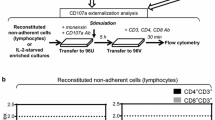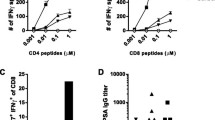Abstract
Prostatic acid phosphatase (PAP) has been investigated as the target of several antigen-specific anti-prostate tumor vaccines. The goal of antigen-specific active immunotherapies targeting PAP would ideally be to elicit PAP-specific CD8+ effector T cells. The identification of PAP-specific CD8+ T-cell epitopes should provide a means of monitoring the immunological efficacy of vaccines targeting PAP, and these epitopes might themselves be developed as vaccine antigens. In the current report, we hypothesized that PAP-specific epitopes might be identified by direct identification of pre-existing CD8+ T cells specific for HLA-A2-restricted peptides derived from PAP in the blood of HLA-A2-expressing individuals. 11 nonamer peptides derived from the amino acid sequence of PAP were used as stimulator antigens in functional ELISPOT assays with peripheral blood mononuclear cells from 20 HLA-A2+ patients with prostate cancer or ten healthy blood donors. Peptide-specific T cells were frequently identified in both groups for three of the peptides, p18–26, p112–120, and p135–143. CD8+ T-cell clones specific for three peptides, p18–26, p112–120, and p299–307, confirmed that these are HLA-A2-restricted T-cell epitopes. Moreover, HLA-A2 transgenic mice immunized with a DNA vaccine encoding PAP developed epitope-specific responses for one or more of these three peptide epitopes. We propose that this method to first identify epitopes for which there are pre-existing epitope-specific T cells could be used to prioritize MHC class I-specific epitopes for other antigens. In addition, we propose that the epitopes identified here could be used to monitor immune responses in HLA-A2+ patients receiving vaccines targeting PAP to identify potentially therapeutic immune responses.



Similar content being viewed by others
References
Gutman AB, Gutman EB (1938) An acid phosphatase in the serum of patients with metastasizing carcinoma of the prostate gland. J Clin Invest 17:473–479
Jobsis AC, De Vries GP, Anholt RR, Sanders GT (1978) Demonstration of the prostatic origin of metastases: an immunohistochemical method for formalin-fixed embedded tissue. Cancer 41:1788–1793
Siddall JK, Cooper EH, Newling DWW, Robinson MRG, Whelan P (1986) An evaluation of the immunochemical measurement of prostatic acid phosphatase and prostatic specific antigen in carcinoma of the prostate. Eur Urol 12:123–130
O’Keefe DS, Bacich DJ, Heston WD (2004) Comparative analysis of prostate-specific membrane antigen (PSMA) versus a prostate-specific membrane antigen-like gene. Prostate 58:200–210
Laus R, Yang DM, Ruegg CL, Shapero MH, Slagle PH, Small E, Burch P, Valone FH (2001) Dendritic cell immunotherapy of prostate cancer: preclinical models and early clinical experience. Canc Res Ther Control 11:1–10
Fong L, Ruegg CL, Brockstedt D, Engleman EG, Laus R (1997) Induction of tissue-specific autoimmune prostatitis with prostatic acid phosphatase immunization; implications for immunotherapy of prostate cancer. J Immunol 159:3113–3117
Johnson LE, Frye TP, Arnot AR, Marquette C, Couture LA, Gendron-Fitzpatrick A, McNeel DG (2006) Safety and immunological efficacy of a prostate cancer plasmid DNA vaccine encoding prostatic acid phosphatase (PAP). Vaccine 24:293–303
Johnson LE, Frye TP, Chinnasamy N, Chinnasamy D, McNeel DG (2007) Plasmid DNA vaccine encoding prostatic acid phosphatase is effective in eliciting autologous antigen-specific CD8+ T cells. Cancer Immunol Immunother 56:885–895
McNeel DG (2005) Prostate cancer antigens and vaccines, preclinical developments. In: Giaccone G, Schilsky R, Sondel P (eds) Cancer chemotherapy and biological response modifiers, annual 22. Elsevier, Amsterdam, pp 247–261
Burch PA, Breen JK, Buckner JC, Gastineau DA, Kaur JA, Laus RL, Padley DJ, Peshwa MV, Pitot HC, Richardson RL, Smits BJ, Sopapan P, Strang G, Valone FH, Vuk-Pavlovic S (2000) Priming tissue-specific cellular immunity in a phase I trial of autologous dendritic cells for prostate cancer. Clin Cancer Res 6:2175–2182
Small EJ, Fratesi P, Reese DM, Strang G, Laus R, Peshwa MV, Valone FH (2000) Immunotherapy of hormone-refractory prostate cancer with antigen-loaded dendritic cells. J Clin Oncol 18:3894–3903
Fong L, Brockstedt D, Benike C, Breen JK, Strang G, Ruegg CL, Engleman EG (2001) Dendritic cell-based xenoantigen vaccination for prostate cancer immunotherapy. J Immunol 167:7150–7156
McNeel DG, Dunphy EJ, Davies JG, Frye TP, Johnson LE, Staab MJ, Horvath DL, Straus J, Alberti D, Marnocha R, Liu G, Eickhoff JC, Wilding G (2009) Safety and immunological efficacy of a DNA vaccine encoding prostatic acid phosphatase in patients with stage D0 prostate cancer. J Clin Oncol 27:4047–4054
Small EJ, Schellhammer PF, Higano CS, Redfern CH, Nemunaitis JJ, Valone FH, Verjee SS, Jones LA, Hershberg RM (2006) Placebo-controlled phase III trial of immunologic therapy with sipuleucel-T (APC8015) in patients with metastatic, asymptomatic hormone refractory prostate cancer. J Clin Oncol 24:3089–3094
Higano CS, Schellhammer PF, Small EJ, Burch PA, Nemunaitis J, Yuh L, Provost N, Frohlich MW (2009) Integrated data from 2 randomized, double-blind, placebo-controlled, phase 3 trials of active cellular immunotherapy with sipuleucel-T in advanced prostate cancer. Cancer 115:3670–3679
Peshwa MV, Shi JD, Ruegg C, Laus R, van Schooten WC (1998) Induction of prostate tumor-specific CD8+ cytotoxic T-lymphocytes in vitro using antigen-presenting cells pulsed with prostatic acid phosphatase peptide. Prostate 36:129–138
Harada M, Matsueda S, Yao A, Ogata R, Noguchi M, Itoh K (2004) Prostate-related antigen-derived new peptides having the capacity of inducing prostate cancer-reactive CTLs in HLA-A2+ prostate cancer patients. Oncol Rep 12:601–607
Machlenkin A, Paz A, Bar Haim E, Goldberger O, Finkel E, Tirosh B, Volovitz I, Vadai E, Lugassy G, Cytron S, Lemonnier F, Tzehoval E, Eisenbach L (2005) Human CTL epitopes prostatic acid phosphatase-3 and six-transmembrane epithelial antigen of prostate-3 as candidates for prostate cancer immunotherapy. Cancer Res 65:6435–6442
Wang Y, Harada M, Yano H, Ogasawara S, Takedatsu H, Arima Y, Matsueda S, Yamada A, Itoh K (2005) Prostatic acid phosphatase as a target molecule in specific immunotherapy for patients with nonprostate adenocarcinoma. J Immunother 28:535–541
McNeel DG, Knutson KL, Schiffman K, Davis DR, Caron D, Disis ML (2003) Pilot study of an HLA-A2 peptide vaccine using flt3 ligand as a systemic vaccine adjuvant. J Clin Immunol 23:62–72
Fernandez-Vina MA, Falco M, Sun Y, Stastny P (1992) DNA typing for HLA class I alleles: I. Subsets of HLA-A2 and of -A28. Hum Immunol 33:163–173
Sauma SY, Gammon MC, Bednarek MA, Cunningham B, Biddison WE, Hermes JD, Porter G, Tamhankar S, Hawkins JC, Bush BL et al (1993) Recognition by HLA-A2-restricted cytotoxic T lymphocytes of endogenously generated and exogenously provided synthetic peptide analogues of the influenza A virus matrix protein. Hum Immunol 37:252–258
Khanna R, Burrows SR, Nicholls J, Poulsen LM (1998) Identification of cytotoxic T cell epitopes within Epstein-Barr virus (EBV) oncogene latent membrane protein 1 (LMP1): evidence for HLA A2 supertype-restricted immune recognition of EBV-infected cells by LMP1-specific cytotoxic T lymphocytes. Eur J Immunol 28:451–458
Knutson KL, Schiffman K, Disis ML (2001) Immunization with a HER-2/neu helper peptide vaccine generates HER-2/neu CD8 T-cell immunity in cancer patients. J Clin Invest 107:477–484
Yee C, Thompson JA, Byrd D, Riddell SR, Roche P, Celis E, Greenberg PD (2002) Adoptive T cell therapy using antigen-specific CD8+ T cell clones for the treatment of patients with metastatic melanoma: in vivo persistence, migration, and antitumor effect of transferred T cells. Proc Natl Acad Sci USA 99:16168–16173
Rammensee HG, Falk K, Rotzschke O (1993) Peptides naturally presented by MHC class I molecules. Annu Rev Immunol 11:213–244
Rammensee H, Bachmann J, Emmerich NP, Bachor OA, Stevanovic S (1999) SYFPEITHI: database for MHC ligands and peptide motifs. Immunogenetics 50:213–219
Parker KC, Bednarek MA, Coligan JE (1994) Scheme for ranking potential HLA-A2 binding peptides based on independent binding of individual peptide side-chains. J Immunol 152:163–175
Small EJ, Rini B, Higano C, Redfern C, Nemunaitis J, Valone F, Kylstra J, Schellhammer PF (2003) A randomized, placebo-controlled phase III trial of APC8015 in patients with androgen-independent prostate cancer (AiPCa). Proc Am Soc Clin Oncol 22:1534
Berzofsky JA, Oh S, Terabe M (2005) Peptide vaccines against cancer. Cancer Treat Res 123:115–136
Disis ML, McNeel DG, Rinn K, Schiffman KA, Knutson KL (1999) Peptide-based tumor vaccines. Curr Opin Oncol Endo Met Invest Drugs 1:253–259
Kouiavskaia DV, Berard CA, Datena E, Hussain A, Dawson N, Klyushnenkova EN, Alexander RB (2009) Vaccination with agonist peptide PSA: 154-163 (155L) derived from prostate specific antigen induced CD8 T-cell response to the native peptide PSA: 154-163 but failed to induce the reactivity against tumor targets expressing PSA: a phase 2 study in patients with recurrent prostate cancer. J Immunother 32:655–666
Sanda MG, Restifo NP, Walsh JC, Kawakami Y, Nelson WG, Pardoll DM, Simons JW (1995) Molecular characterization of defective antigen processing in human prostate cancer. J Natl Cancer Inst 87:280–285
Lee HM, Timme TL, Thompson TC (2000) Resistance to lysis by cytotoxic T cells: a dominant effect in metastatic mouse prostate cancer cells. Cancer Res 60:1927–1933
Acknowledgments
This work was supported for BMO, TPF, LEJ and DGM by NIH (K23 RR16489) and the US Army Medical Research and Materiel Command (DAMD 17-03-1-0050 and W81XWH-07-1-0038). This work was supported for KLK and MLD by grants from the NIH (K24 CA85218 and R01 CA75163), and for LF by R01 CA136753.
Author information
Authors and Affiliations
Corresponding author
Rights and permissions
About this article
Cite this article
Olson, B.M., Frye, T.P., Johnson, L.E. et al. HLA-A2-restricted T-cell epitopes specific for prostatic acid phosphatase. Cancer Immunol Immunother 59, 943–953 (2010). https://doi.org/10.1007/s00262-010-0820-6
Received:
Accepted:
Published:
Issue Date:
DOI: https://doi.org/10.1007/s00262-010-0820-6




